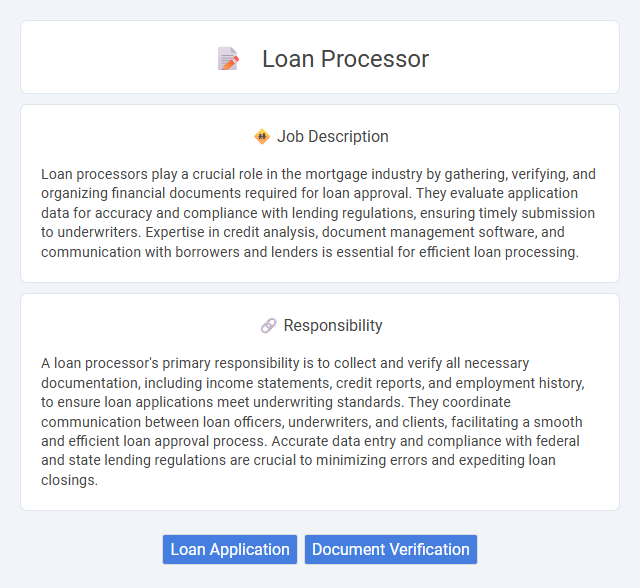
Loan processors play a crucial role in the mortgage industry by gathering, verifying, and organizing financial documents required for loan approval. They evaluate application data for accuracy and compliance with lending regulations, ensuring timely submission to underwriters. Expertise in credit analysis, document management software, and communication with borrowers and lenders is essential for efficient loan processing.
Individuals with strong organizational skills and attention to detail are likely suitable for a loan processor position, as the job requires managing extensive documentation and ensuring accuracy. Those who thrive in structured environments and can maintain focus under pressure may find this role fitting. People who struggle with repetitive tasks or prefer highly social roles might be less compatible with the demands of loan processing.
Qualification
A loan processor must possess strong organizational skills and a thorough understanding of financial regulations and documentation requirements. Proficiency in loan software systems, attention to detail, and the ability to verify borrower information accurately are critical qualifications. Experience in mortgage lending or consumer loans, combined with excellent communication skills, ensures efficient coordination between applicants, underwriters, and loan officers.
Responsibility
A loan processor's primary responsibility is to collect and verify all necessary documentation, including income statements, credit reports, and employment history, to ensure loan applications meet underwriting standards. They coordinate communication between loan officers, underwriters, and clients, facilitating a smooth and efficient loan approval process. Accurate data entry and compliance with federal and state lending regulations are crucial to minimizing errors and expediting loan closings.
Benefit
Loan processor jobs probably offer benefits such as comprehensive health insurance, retirement plans, and paid time off, which can provide financial security and work-life balance. Opportunities for career growth and skill development in the financial sector may additionally enhance long-term job satisfaction. Flexible work arrangements could also be a potential advantage, contributing to improved productivity and employee well-being.
Challenge
Loan processors likely face significant challenges managing extensive documentation and strict deadlines while ensuring accuracy and compliance with regulatory requirements. The probability of encountering time-sensitive issues increases the need for strong organizational skills and attention to detail. Balancing communication between borrowers, lenders, and underwriters may further complicate the role, demanding efficient multitasking and problem-solving abilities.
Career Advancement
A loan processor plays a pivotal role in the financial industry by managing the verification and documentation required for loan applications, ensuring accuracy and compliance. Career advancement for loan processors often leads to roles such as loan underwriter, loan officer, or mortgage loan processor supervisor, offering increased responsibility and higher earning potential. Continuous skill development in financial regulations, software proficiency, and customer service enhances opportunities for promotion within banks, credit unions, and mortgage companies.
Key Terms
Loan Application
A loan processor manages the loan application process by verifying borrower information, reviewing credit reports, and ensuring all necessary documents are complete and accurate. Efficient handling of loan applications accelerates approval timelines and minimizes errors that could delay funding. Proficiency with mortgage software and adherence to regulatory requirements are essential for streamlining loan application workflows and enhancing customer satisfaction.
Document Verification
Loan processors specialize in verifying and organizing critical financial documents such as income statements, credit reports, and property titles to ensure loan applications meet regulatory standards. Accurate document verification minimizes the risk of fraud and expedites the approval process by confirming all information is complete and compliant with lending guidelines. Proficiency in digital document management tools and attention to detail are essential skills for effective loan processing and verification.
 kuljobs.com
kuljobs.com